Resume
Physical Therapist Cover Letter Examples

May 29, 2025
|
12 min read
Perfect your physical therapist cover letter to land the job. Communicate your passion and skills with ease while avoiding common pitfalls. Let your words heal and help potential employers feel the impact you can make.
4.70 Average rating
Rated by 348 people
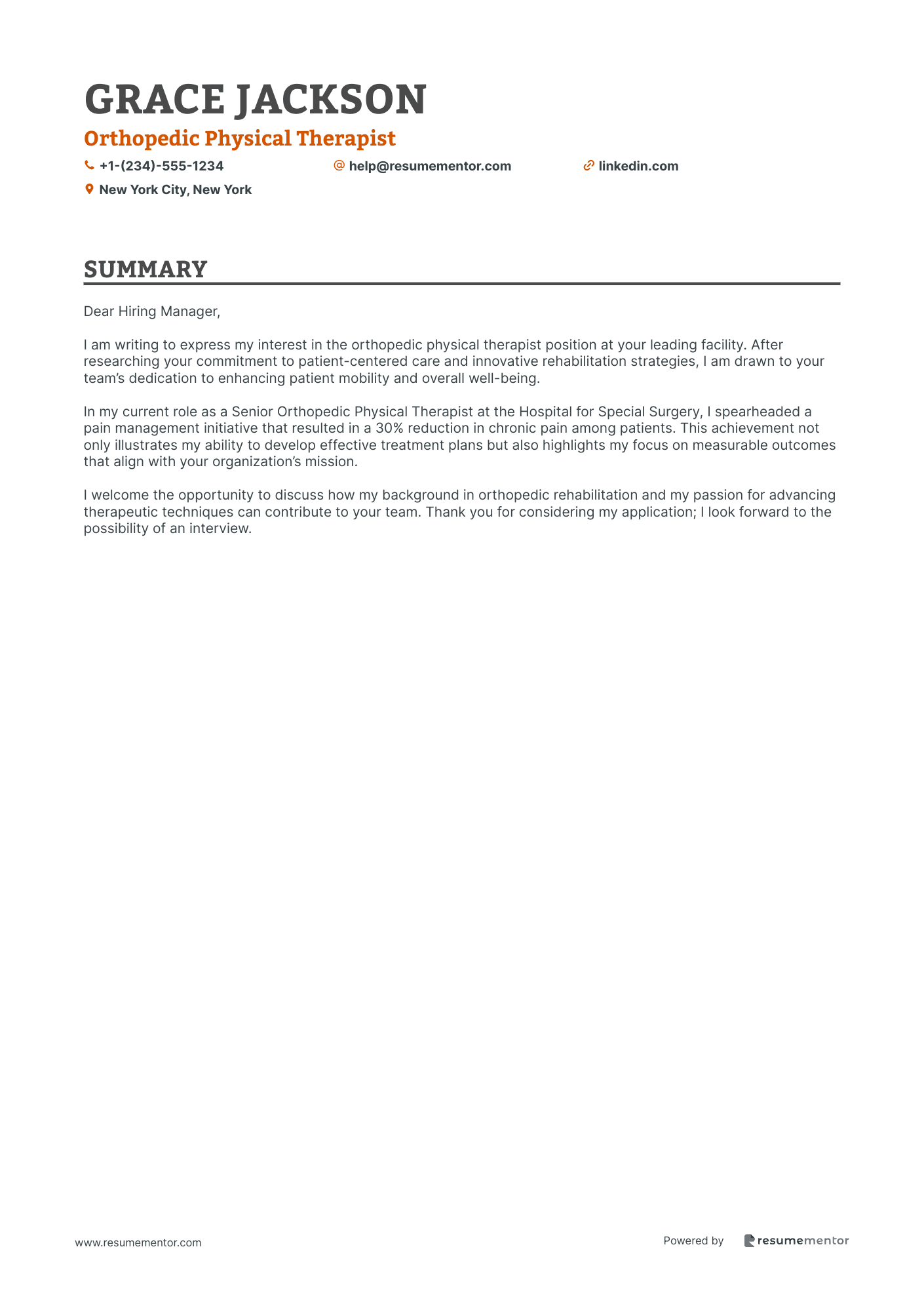
Orthopedic Physical Therapist
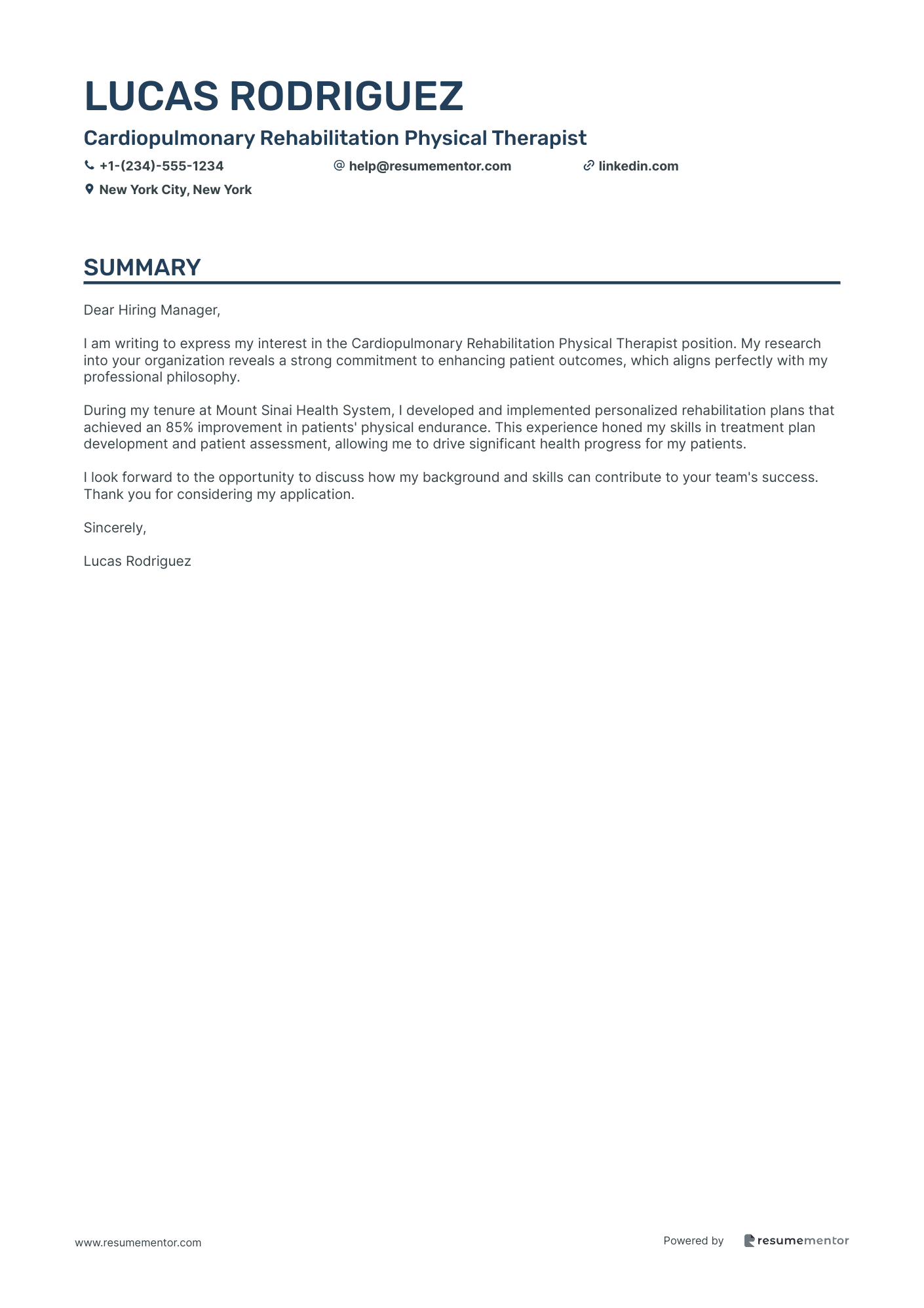
Cardiopulmonary Rehabilitation Physical Therapist
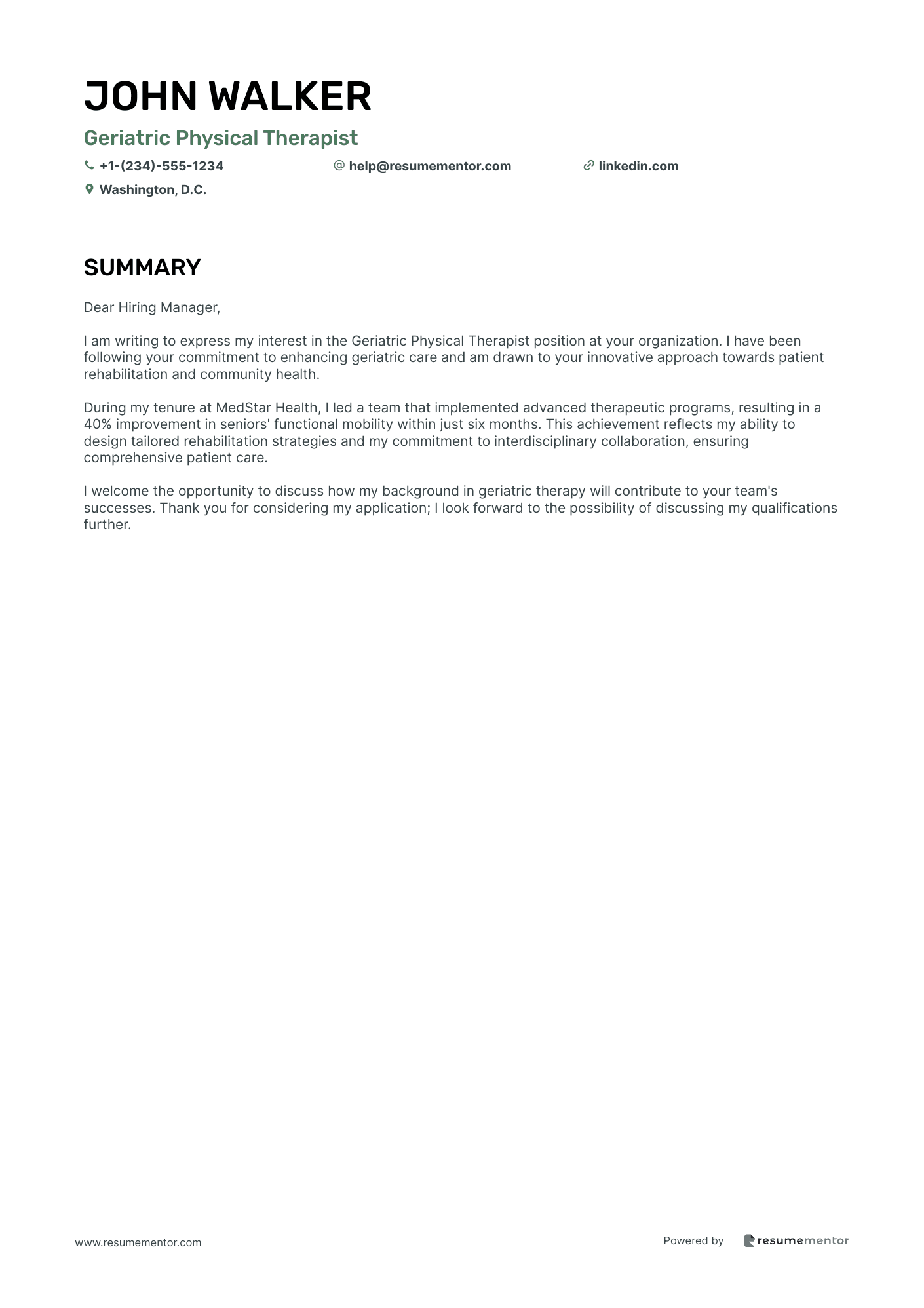
Geriatric Physical Therapist
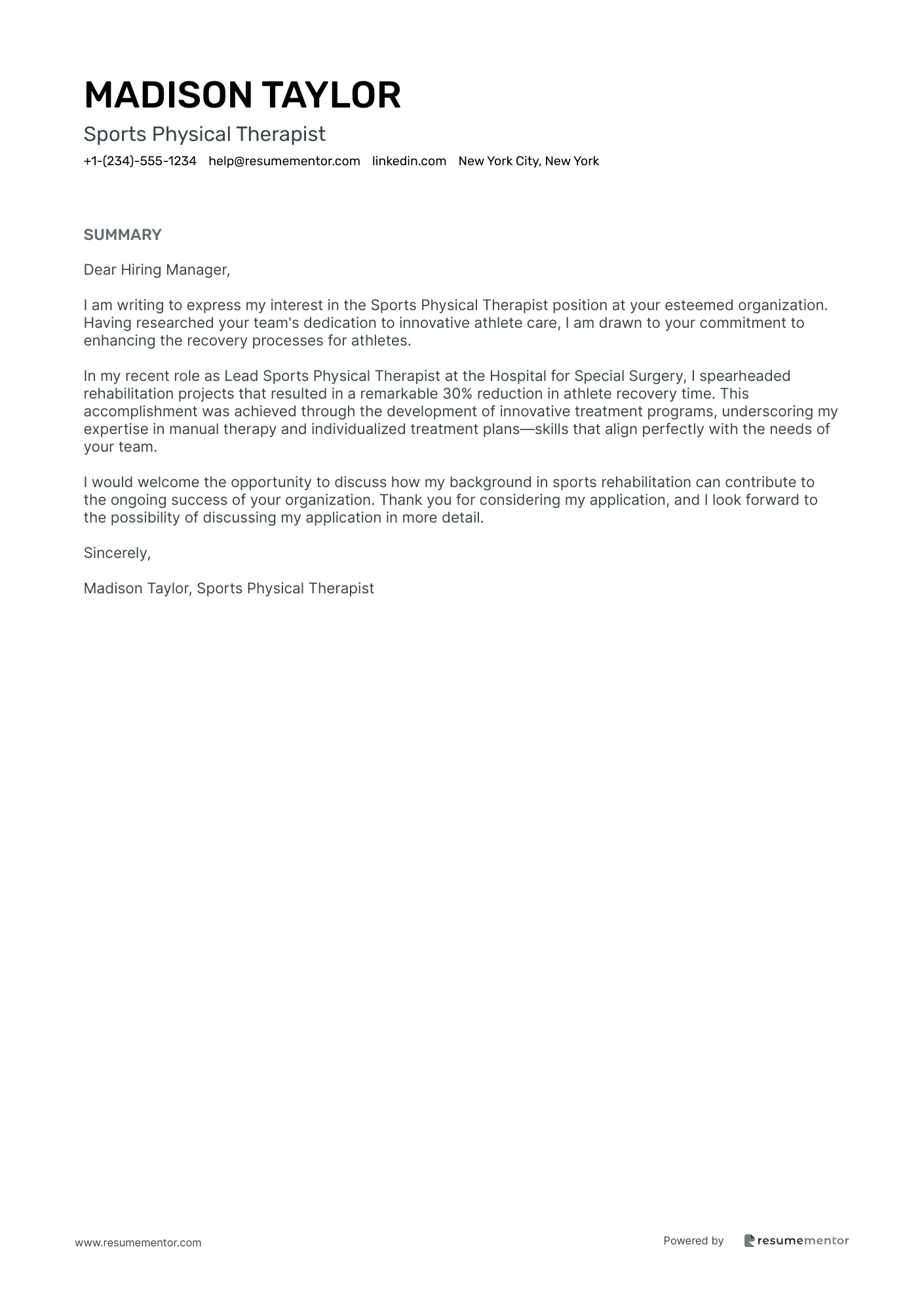
Sports Physical Therapist
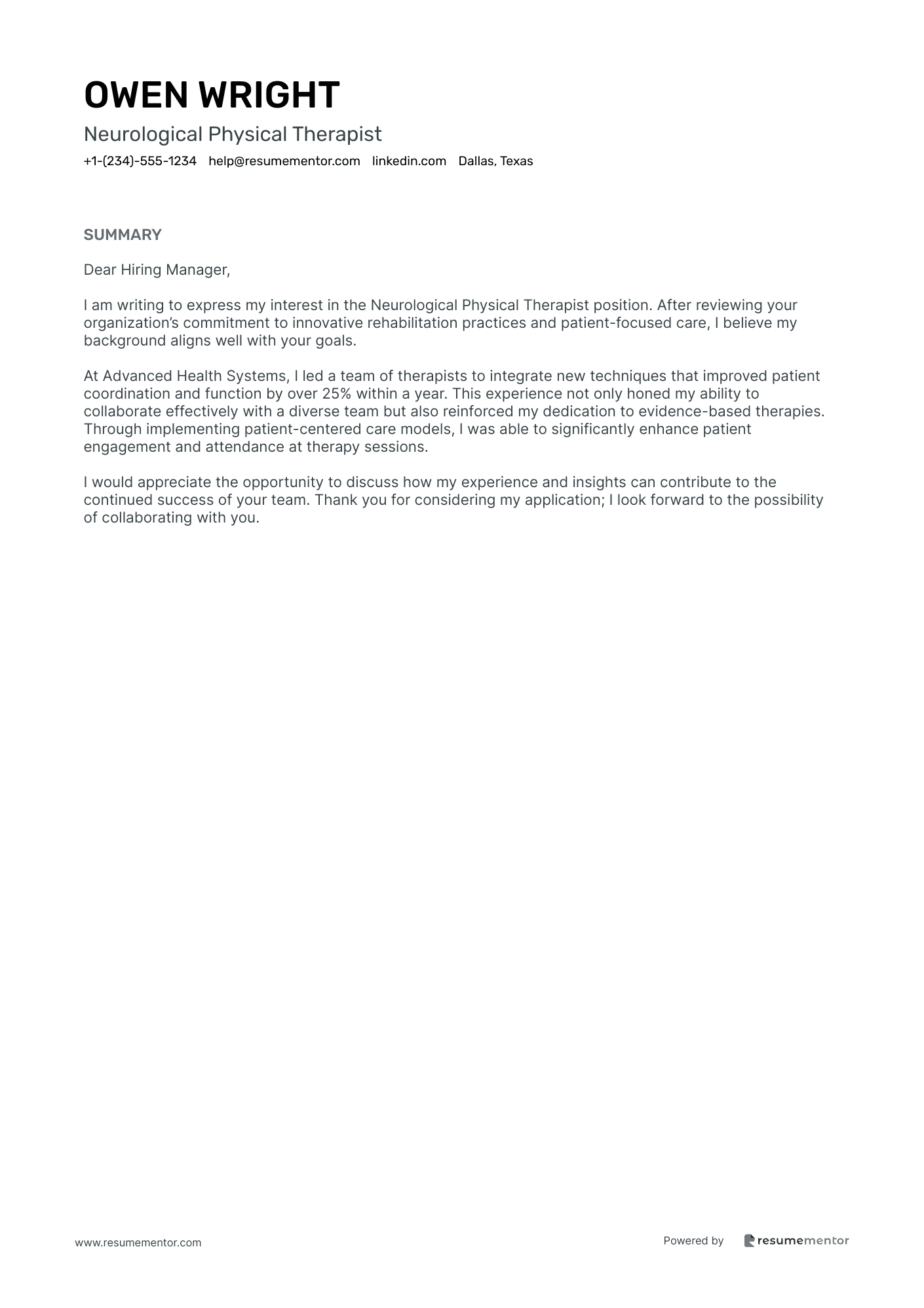
Neurological Physical Therapist
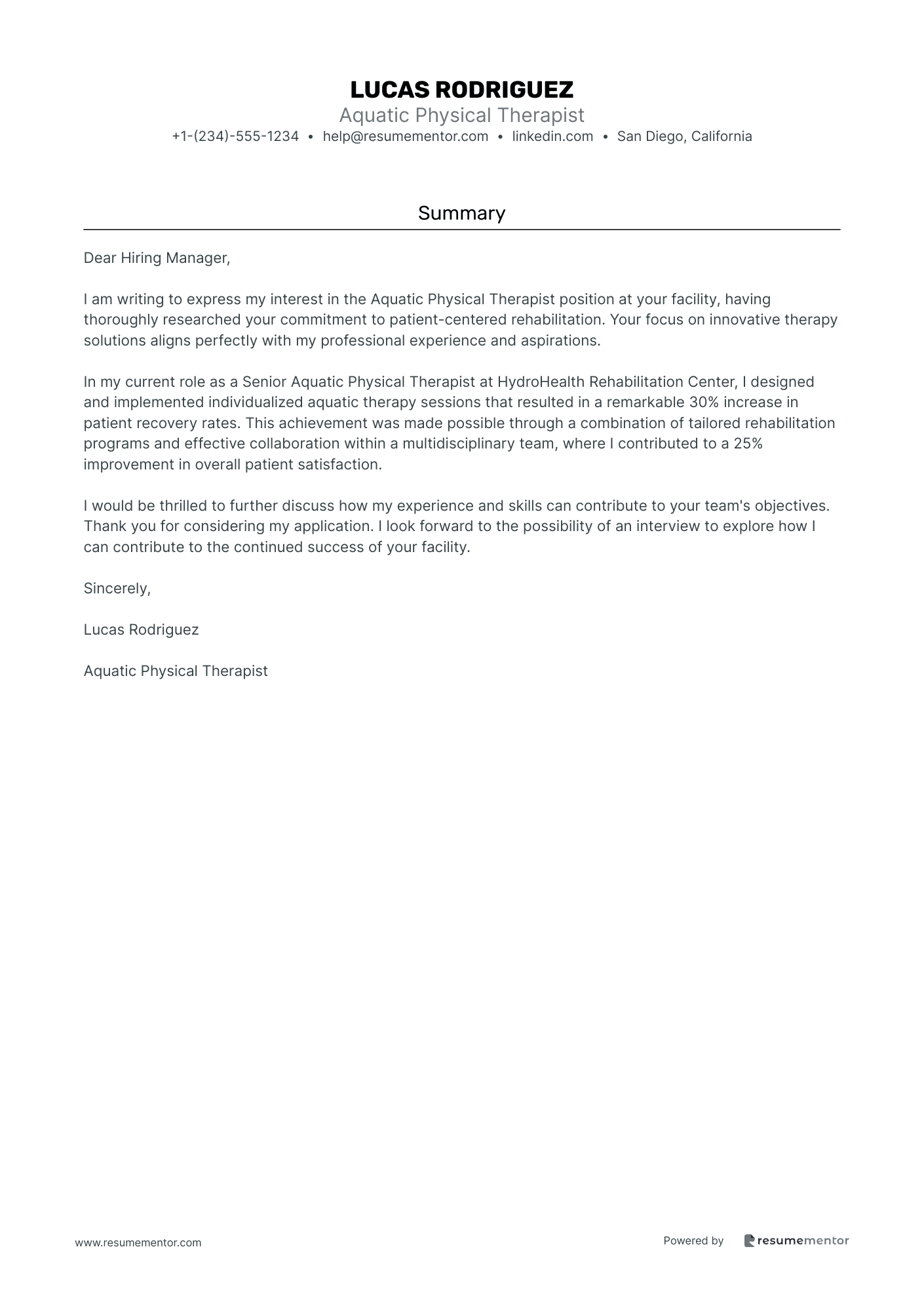
Aquatic Physical Therapist
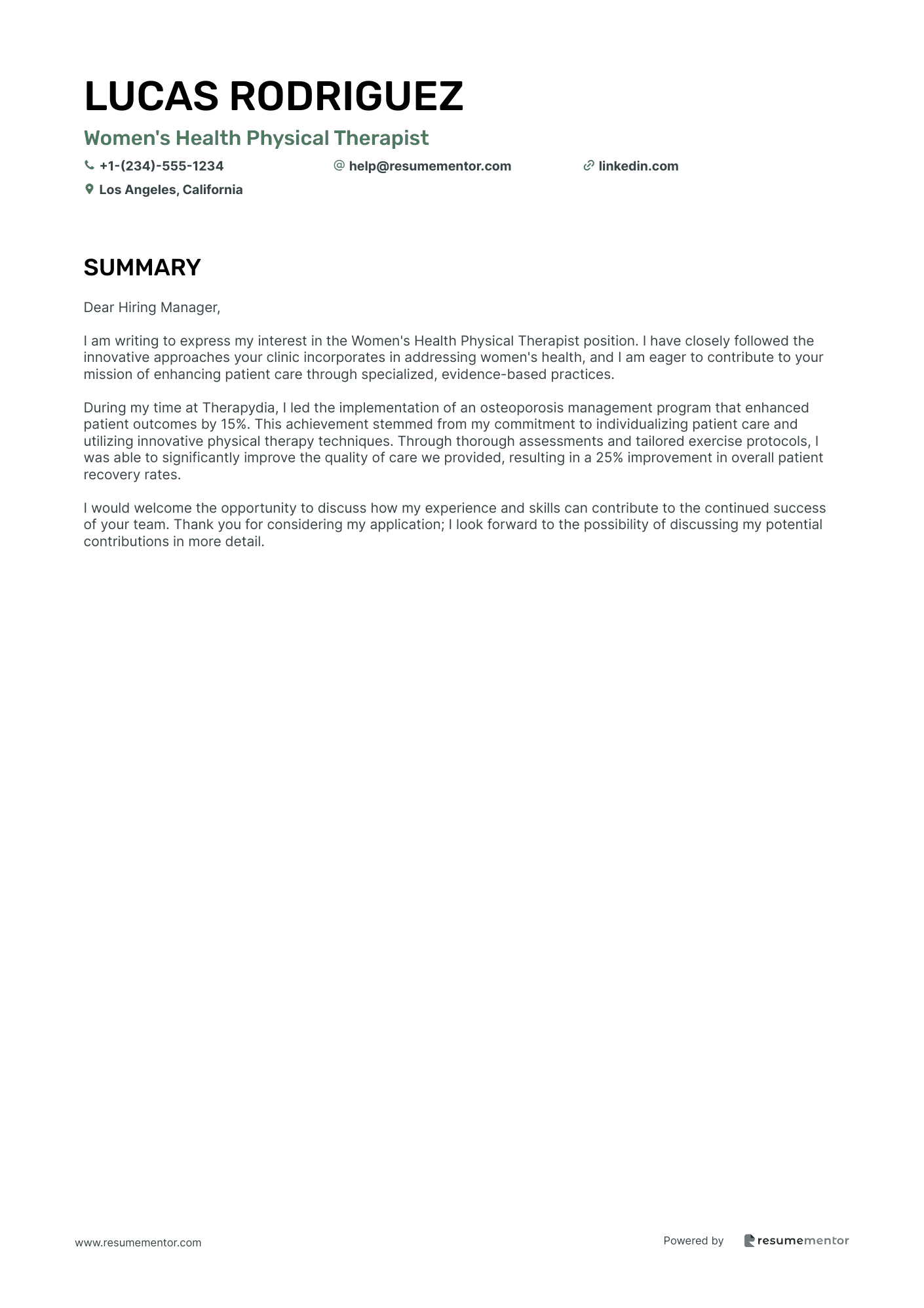
Women's Health Physical Therapist
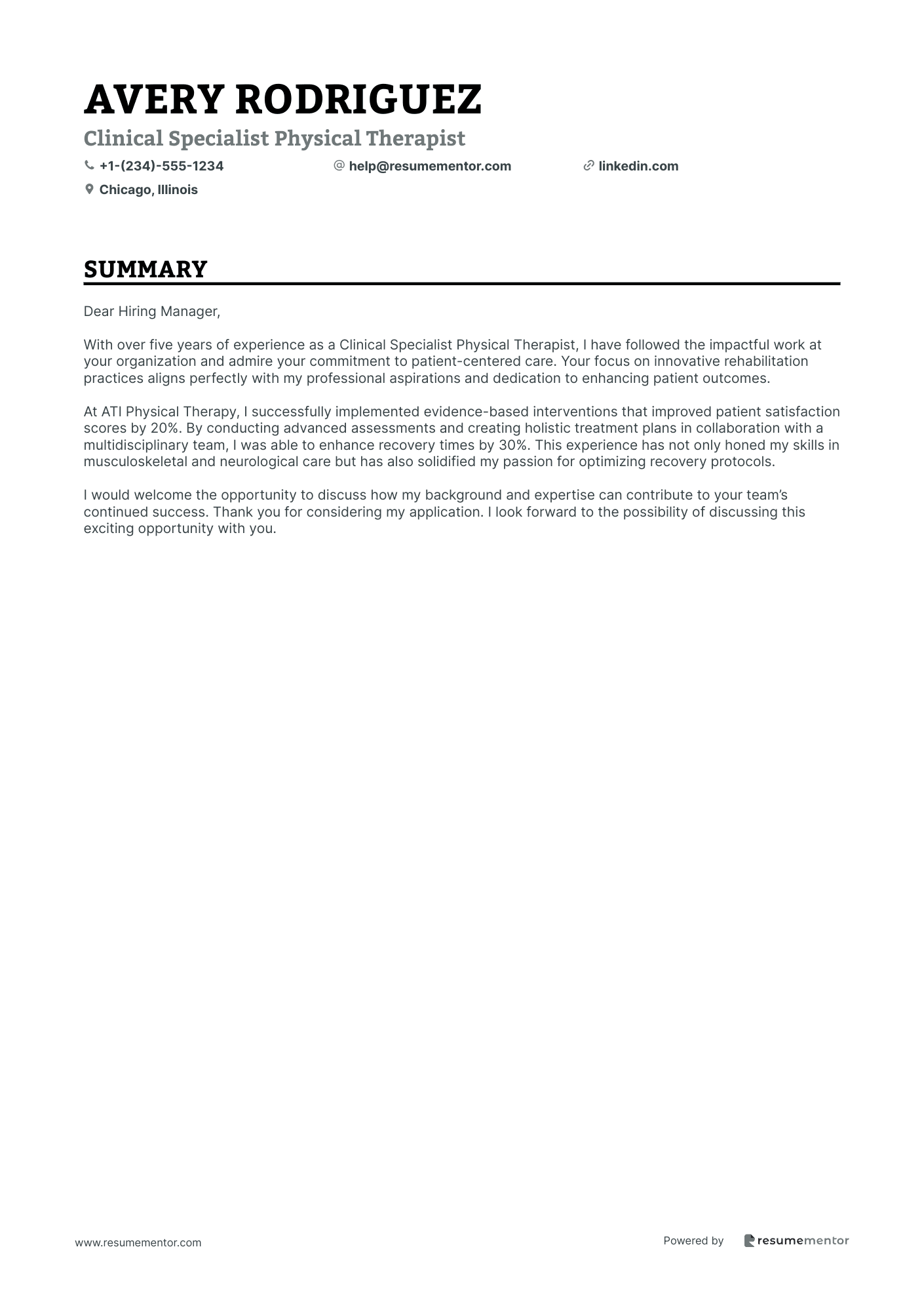
Clinical Specialist Physical Therapist
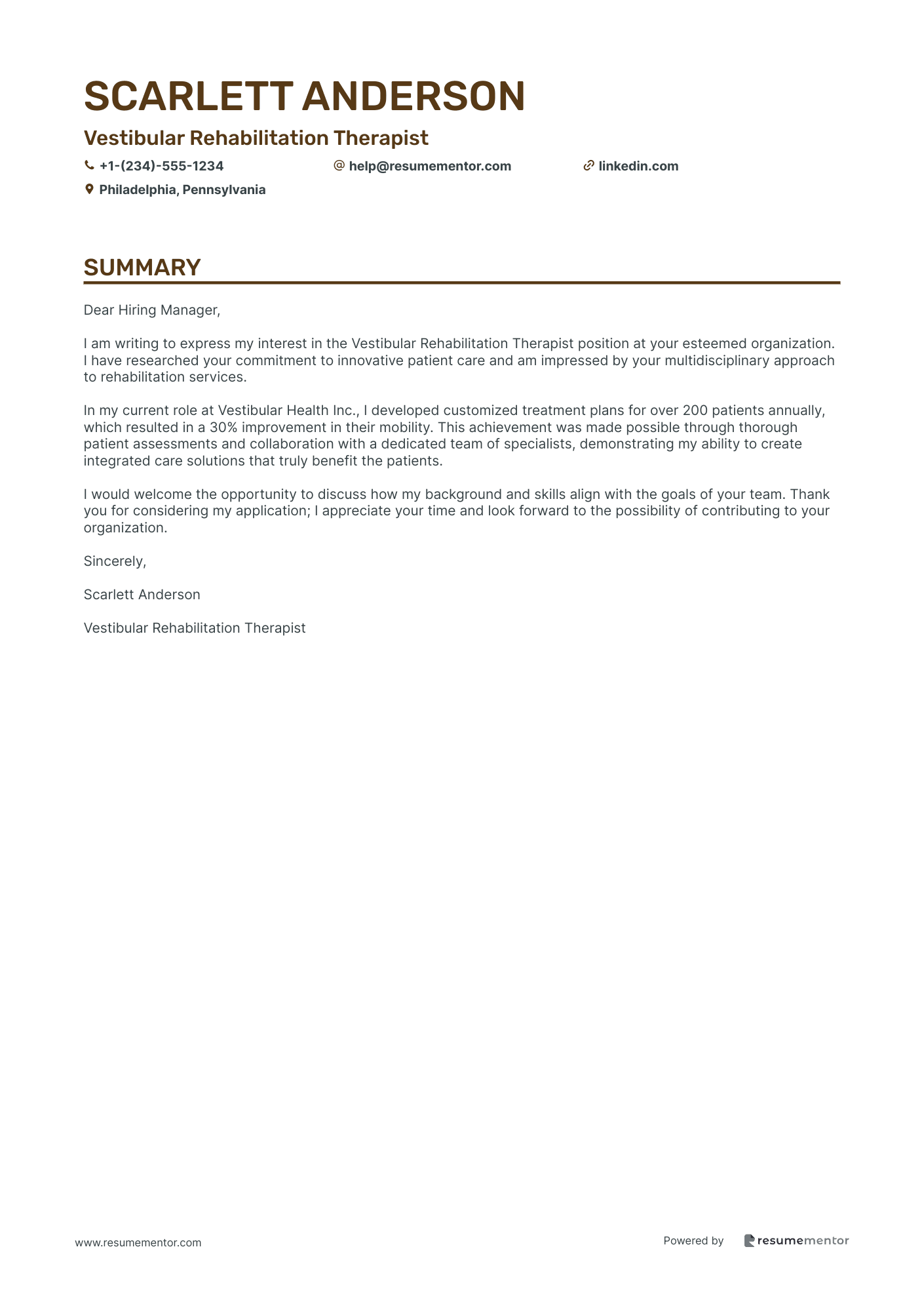
Vestibular Rehabilitation Therapist
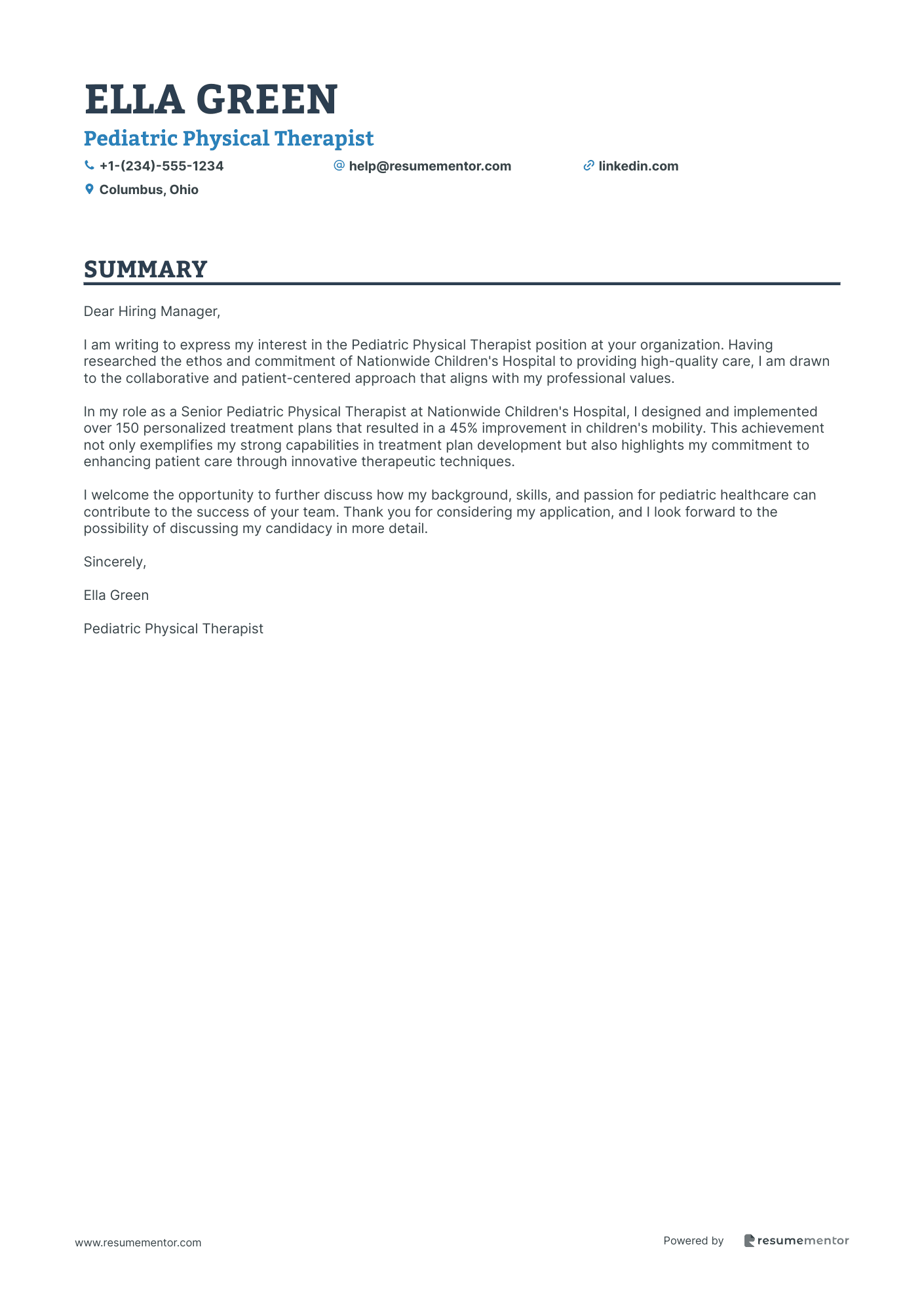
Pediatric Physical Therapist

Orthopedic Physical Therapist cover letter sample
When applying for this role, focus on your hands-on experience in rehabilitation and recovery. Highlight any coursework related to human anatomy, biomechanics, or therapeutic techniques. If you have certifications like 'Orthopedic Manual Therapy' or 'Sports Rehabilitation,' include these as they demonstrate your commitment to ongoing learning. Provide specific examples of your treatment plans and their outcomes. Use the 'skill-action-result' format to showcase improvements in patient mobility or decreased pain levels, which illustrate your effectiveness in enhancing patient quality of life.
Grace Jackson
Orthopedic Physical Therapist
Summary
Dear Hiring Manager,
I am writing to express my interest in the orthopedic physical therapist position at your leading facility. After researching your commitment to patient-centered care and innovative rehabilitation strategies, I am drawn to your team’s dedication to enhancing patient mobility and overall well-being.
In my current role as a Senior Orthopedic Physical Therapist at the Hospital for Special Surgery, I spearheaded a pain management initiative that resulted in a 30% reduction in chronic pain among patients. This achievement not only illustrates my ability to develop effective treatment plans but also highlights my focus on measurable outcomes that align with your organization’s mission.
I welcome the opportunity to discuss how my background in orthopedic rehabilitation and my passion for advancing therapeutic techniques can contribute to your team. Thank you for considering my application; I look forward to the possibility of an interview.
Cardiopulmonary Rehabilitation Physical Therapist cover letter sample
When crafting your cover letter, focus on any relevant clinical experience in rehabilitation settings. Highlight your hands-on skills with exercise prescription and patient assessment techniques. Emphasize your understanding of cardiovascular and pulmonary conditions, showcasing any certifications, such as Basic Life Support or Advanced Cardiac Life Support. Use specific examples to demonstrate how your patient education efforts have led to improved outcomes. Illustrate your ability to work in interdisciplinary teams and how it has fostered a holistic approach to patient care, driving better recovery results.
Lucas Rodriguez
Cardiopulmonary Rehabilitation Physical Therapist
Summary
Dear Hiring Manager,
I am writing to express my interest in the Cardiopulmonary Rehabilitation Physical Therapist position. My research into your organization reveals a strong commitment to enhancing patient outcomes, which aligns perfectly with my professional philosophy.
During my tenure at Mount Sinai Health System, I developed and implemented personalized rehabilitation plans that achieved an 85% improvement in patients' physical endurance. This experience honed my skills in treatment plan development and patient assessment, allowing me to drive significant health progress for my patients.
I look forward to the opportunity to discuss how my background and skills can contribute to your team's success. Thank you for considering my application.
Sincerely,
Lucas Rodriguez
Geriatric Physical Therapist cover letter sample
When applying for this role, highlight any experience working with elderly patients. Emphasize your knowledge of age-related conditions and rehabilitation techniques. If you have certifications in geriatric care or gerontology, be sure to mention them. Detail your ability to develop personalized therapy plans that improve mobility and independence. Share specific examples of how your interventions have led to positive outcomes, using a 'skill-action-result' format. This will showcase your effectiveness and help demonstrate the value you bring to potential employers.
John Walker
Geriatric Physical Therapist
Summary
Dear Hiring Manager,
I am writing to express my interest in the Geriatric Physical Therapist position at your organization. I have been following your commitment to enhancing geriatric care and am drawn to your innovative approach towards patient rehabilitation and community health.
During my tenure at MedStar Health, I led a team that implemented advanced therapeutic programs, resulting in a 40% improvement in seniors' functional mobility within just six months. This achievement reflects my ability to design tailored rehabilitation strategies and my commitment to interdisciplinary collaboration, ensuring comprehensive patient care.
I welcome the opportunity to discuss how my background in geriatric therapy will contribute to your team's successes. Thank you for considering my application; I look forward to the possibility of discussing my qualifications further.
Sports Physical Therapist cover letter sample
When crafting your cover letter, focus on your educational background in physical therapy and any specialized training in sports rehabilitation. Highlight your experience working with athletes, showcasing any success stories where your intervention improved their performance or recovery time. Strong interpersonal skills are essential, so mention how you've built rapport with clients to motivate them. Include certifications such as 'Certified Strength and Conditioning Specialist' or additional workshops, emphasizing how they enhance your practical knowledge and align with the demands of high-performance environments.
Madison Taylor
Sports Physical Therapist
Summary
Dear Hiring Manager,
I am writing to express my interest in the Sports Physical Therapist position at your esteemed organization. Having researched your team's dedication to innovative athlete care, I am drawn to your commitment to enhancing the recovery processes for athletes.
In my recent role as Lead Sports Physical Therapist at the Hospital for Special Surgery, I spearheaded rehabilitation projects that resulted in a remarkable 30% reduction in athlete recovery time. This accomplishment was achieved through the development of innovative treatment programs, underscoring my expertise in manual therapy and individualized treatment plans—skills that align perfectly with the needs of your team.
I would welcome the opportunity to discuss how my background in sports rehabilitation can contribute to the ongoing success of your organization. Thank you for considering my application, and I look forward to the possibility of discussing my application in more detail.
Sincerely,
Madison Taylor, Sports Physical Therapist
Neurological Physical Therapist cover letter sample
When applying for this role, it is essential to showcase your experience with neurological conditions and rehabilitation. Include any specialized training or certifications, such as handling stroke recovery or traumatic brain injuries. Highlight your manual therapy skills and any innovative treatment techniques you have used. Provide examples of how your interventions improved patient mobility and quality of life. Emphasize your teamwork with multidisciplinary professionals and your ability to develop personalized care plans. This will demonstrate your capacity to make a measurable impact in patient outcomes.
Owen Wright
Neurological Physical Therapist
Summary
Dear Hiring Manager,
I am writing to express my interest in the Neurological Physical Therapist position. After reviewing your organization’s commitment to innovative rehabilitation practices and patient-focused care, I believe my background aligns well with your goals.
At Advanced Health Systems, I led a team of therapists to integrate new techniques that improved patient coordination and function by over 25% within a year. This experience not only honed my ability to collaborate effectively with a diverse team but also reinforced my dedication to evidence-based therapies. Through implementing patient-centered care models, I was able to significantly enhance patient engagement and attendance at therapy sessions.
I would appreciate the opportunity to discuss how my experience and insights can contribute to the continued success of your team. Thank you for considering my application; I look forward to the possibility of collaborating with you.
Aquatic Physical Therapist cover letter sample
When applying for the role, focus on your relevant experience in rehabilitation and aquatic therapy. Highlight any certifications like 'Aquatic Therapy Certification' or specialized training in hydrokinetics. It's important to showcase your knowledge of different aquatic techniques and how they benefit patient recovery. Provide examples of successful programs you've implemented, emphasizing patient improvement and satisfaction. Demonstrate your ability to adapt treatment plans based on individual needs. Mention collaboration with other healthcare professionals, highlighting teamwork and communication skills that enhance patient outcomes.
Lucas Rodriguez
Aquatic Physical Therapist
Summary
Dear Hiring Manager,
I am writing to express my interest in the Aquatic Physical Therapist position at your facility, having thoroughly researched your commitment to patient-centered rehabilitation. Your focus on innovative therapy solutions aligns perfectly with my professional experience and aspirations.
In my current role as a Senior Aquatic Physical Therapist at HydroHealth Rehabilitation Center, I designed and implemented individualized aquatic therapy sessions that resulted in a remarkable 30% increase in patient recovery rates. This achievement was made possible through a combination of tailored rehabilitation programs and effective collaboration within a multidisciplinary team, where I contributed to a 25% improvement in overall patient satisfaction.
I would be thrilled to further discuss how my experience and skills can contribute to your team's objectives. Thank you for considering my application. I look forward to the possibility of an interview to explore how I can contribute to the continued success of your facility.
Sincerely,
Lucas Rodriguez
Aquatic Physical Therapist
Women's Health Physical Therapist cover letter sample
When applying for this position, focus on your experience with pelvic health therapy and women's health issues. Highlight any specialized training, workshops, or certifications in areas like prenatal and postpartum care. It's important to demonstrate your understanding of conditions such as diastasis recti or pelvic pain. Use the 'skill-action-result' format to illustrate how your therapeutic techniques have improved patient outcomes. Discuss your ability to foster a supportive environment and communicate effectively with female patients, emphasizing empathy and personalized care in your application.
Lucas Rodriguez
Women's Health Physical Therapist
Summary
Dear Hiring Manager,
I am writing to express my interest in the Women's Health Physical Therapist position. I have closely followed the innovative approaches your clinic incorporates in addressing women's health, and I am eager to contribute to your mission of enhancing patient care through specialized, evidence-based practices.
During my time at Therapydia, I led the implementation of an osteoporosis management program that enhanced patient outcomes by 15%. This achievement stemmed from my commitment to individualizing patient care and utilizing innovative physical therapy techniques. Through thorough assessments and tailored exercise protocols, I was able to significantly improve the quality of care we provided, resulting in a 25% improvement in overall patient recovery rates.
I would welcome the opportunity to discuss how my experience and skills can contribute to the continued success of your team. Thank you for considering my application; I look forward to the possibility of discussing my potential contributions in more detail.
Clinical Specialist Physical Therapist cover letter sample
When applying for this role, highlight any relevant clinical experience in physical therapy settings. Emphasize your expertise in rehabilitation techniques and patient education. If you have certifications such as 'Advanced Manual Therapy' or 'Sports Rehabilitation', mention these to showcase your specialized skills. Provide specific examples of patient outcomes that illustrate your ability to improve mobility and reduce pain. Use a 'skill-action-result' format to detail how your interventions have positively impacted patient recovery and overall satisfaction, demonstrating your value to potential employers.
Avery Rodriguez
Clinical Specialist Physical Therapist
Summary
Dear Hiring Manager,
With over five years of experience as a Clinical Specialist Physical Therapist, I have followed the impactful work at your organization and admire your commitment to patient-centered care. Your focus on innovative rehabilitation practices aligns perfectly with my professional aspirations and dedication to enhancing patient outcomes.
At ATI Physical Therapy, I successfully implemented evidence-based interventions that improved patient satisfaction scores by 20%. By conducting advanced assessments and creating holistic treatment plans in collaboration with a multidisciplinary team, I was able to enhance recovery times by 30%. This experience has not only honed my skills in musculoskeletal and neurological care but has also solidified my passion for optimizing recovery protocols.
I would welcome the opportunity to discuss how my background and expertise can contribute to your team’s continued success. Thank you for considering my application. I look forward to the possibility of discussing this exciting opportunity with you.
Vestibular Rehabilitation Therapist cover letter sample
In your cover letter, emphasize any clinical experience you have in balance and vestibular disorders. Highlight your ability to assess patients' needs and create tailored treatment plans. Mention relevant certifications or coursework, such as 'Vestibular Rehabilitation' or 'Balance Assessment Techniques,' to demonstrate your expertise. Include examples of how your interventions improved patient outcomes, using a 'skill-action-result' format. Additionally, showcase your collaboration with multidisciplinary teams and your commitment to continuing education in this specialized field to underscore your dedication to patient care.
Scarlett Anderson
Vestibular Rehabilitation Therapist
Summary
Dear Hiring Manager,
I am writing to express my interest in the Vestibular Rehabilitation Therapist position at your esteemed organization. I have researched your commitment to innovative patient care and am impressed by your multidisciplinary approach to rehabilitation services.
In my current role at Vestibular Health Inc., I developed customized treatment plans for over 200 patients annually, which resulted in a 30% improvement in their mobility. This achievement was made possible through thorough patient assessments and collaboration with a dedicated team of specialists, demonstrating my ability to create integrated care solutions that truly benefit the patients.
I would welcome the opportunity to discuss how my background and skills align with the goals of your team. Thank you for considering my application; I appreciate your time and look forward to the possibility of contributing to your organization.
Sincerely,
Scarlett Anderson
Vestibular Rehabilitation Therapist
Pediatric Physical Therapist cover letter sample
When applying for this role, it’s important to emphasize any hands-on experience working with children, especially in a clinical or school setting. Highlight relevant certifications such as 'Pediatric Developmental Practitioner' or courses in early childhood therapy. Showcase strong interpersonal skills as well, as building trust with young patients and their families is key. Use the 'skill-action-result' approach to illustrate how you assessed children’s needs and designed effective treatment plans, demonstrating real impact on their mobility and overall development.
Ella Green
Pediatric Physical Therapist
Summary
Dear Hiring Manager,
I am writing to express my interest in the Pediatric Physical Therapist position at your organization. Having researched the ethos and commitment of Nationwide Children's Hospital to providing high-quality care, I am drawn to the collaborative and patient-centered approach that aligns with my professional values.
In my role as a Senior Pediatric Physical Therapist at Nationwide Children's Hospital, I designed and implemented over 150 personalized treatment plans that resulted in a 45% improvement in children's mobility. This achievement not only exemplifies my strong capabilities in treatment plan development but also highlights my commitment to enhancing patient care through innovative therapeutic techniques.
I welcome the opportunity to further discuss how my background, skills, and passion for pediatric healthcare can contribute to the success of your team. Thank you for considering my application, and I look forward to the possibility of discussing my candidacy in more detail.
Sincerely,
Ella Green
Pediatric Physical Therapist
Related Articles

Continue Reading
Check more recommended readings to get the job of your dreams.
Resume
Resources
Tools
© 2026. All rights reserved.
Made with love by people who care.
